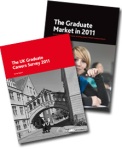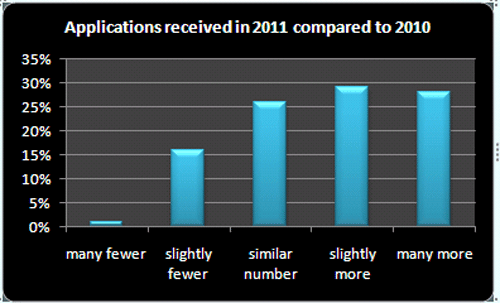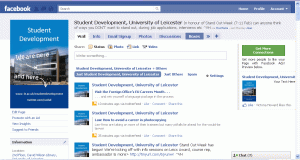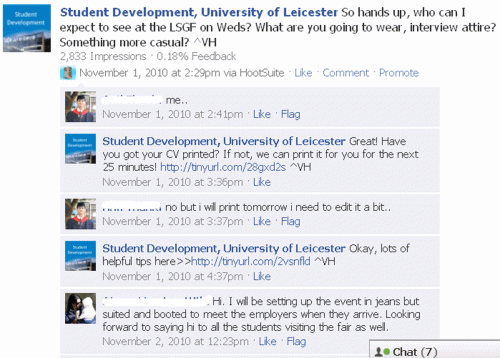 Last year, the Career Development Team here in Student Development launched the ‘Graduate Success Programme’ (GSP). It’s billed as an intensive support package for students graduating in 2011 and provides tailored help through the last few months of University, into the crucial few months after graduation.
Last year, the Career Development Team here in Student Development launched the ‘Graduate Success Programme’ (GSP). It’s billed as an intensive support package for students graduating in 2011 and provides tailored help through the last few months of University, into the crucial few months after graduation.
Last year, the focus was Graduate Success Week; “a week of employer led career development workshops focusing on success in career planning, applications, interviews and assessment centres.” We had 15 sessions, 10 of which were with employers such as Deloitte, Logica and Asda.
We are still having this week of workshops (16th – 20th May) because they were well received last year and students like to see employers on campus. We are cutting down slightly, to 8 employer sessions and 3 sessions hosted by the Career Development Team themselves. Having slightly fewer sessions to chose from might increase student attendance at each session. We are not running any sessions on the Friday this year as, historically, these are always the ones that don’t do very well with student attendance.
The Employer Liaison Team have done a fantastic job (again!) of getting some really great names on board including Accenture, FDM Group and Teach First. They always do really well in ensuring a nice range of sector representation at events like this so there’s something for everyone.
One tip I would say for any student reading this is don’t be too influenced by the employer hosting the session. Obviously, a session with Teach First about assessment centres is a must if you’re going to apply to the Teach First scheme, but after sitting in a lot of sessions last year, I’d say nearly all of them will provide you with useful tips, hints and opinions regardless of the sector you wish to go into. So even if teaching isn’t you for, I guarantee you’ll still learn something useful about assessment centres.
As part of the Graduate Success Programme there is also a Job Hunting Guide and Top Ten Tips for Job Hunting (courtesy of Matt Mobbs) all of which we had last year. If you click on the image you can view the Flickr slideshow.

In addition to these events, we’ve got a Leicestershire Speed Networking Event (LSNE). This is a networking event that takes the format of speed dating. There will be 10 graduate employers in attendance and students will be rotated around 5 employers with a 6th rotation where they can pick any remaining employers to network with. I was really impressed with this idea from our Employer Liaison Team. This event is on Monday 16th May. There are two separate networking sessions, one for finalist and one for all other students.
To make sure we get the numbers we need on the day, we have decided to use a deposit system. It’ll be £10 per student to guarantee your spot and you’ll get the £10 back if you attend. We’ve handled deposit systems before ourselves, simply by asking the students to come and give us the cash and returning it to them on the day of the event. Given the numbers we’re dealing with for the LSNE , all of a sudden this didn’t feel manageable.
So after some quick meetings that Jon Parry, our brilliant Employer Liaison assistant arranged, we’ve got the lovely people from http://shop.le.ac.uk/ to handle our deposits online. Students will now need to pay their £10 via the online shop and will get it refunded after they attend the event. Not only is this much more secure than us handling the cash, it makes life much easier. Plus personally, I think it’s much more professional. Well done to Jon for taking this up!
Last year we had a Careers fair in the Summer, the BET (Business, Engineering & Technology Fair.) This year, the Summer Careers Fair will form part of the Graduate Success Week and is on Tuesday 17th May. The Employer Liaison Team have, after much careful consideration, decided to go with a ‘general’ fair (i.e not subject specific) because it will appeal to a wider audience.
Last year, I was actually part of the Career Development Team. (I noticed earlier I am still on their pages as staff. Must rectify that!) I did various bits and pieces for the GSP, including hosting employer led sessions, general admin tasks like room bookings, some publicity and the web side of things. I was a newbie to web development and Plone so the web side of things was very basic. I was happy with my efforts at the time, thinking back, I was probably very proud! But this year, my ISPP role (Information Systems, Publications & Publicity Team) means I do a lot more web development, mainly project work like Stand Out Week.
So, Matt Mobbs and I got together to start thinking about the website for GSP. I learnt a lot about planning from our work on Stand Out Week (I had to do things more than once because I didn’t plan properly) and this really came in handy for GSP.
The main ‘issue’ with the web for the Graduate Success Programme is that it could, if not planned and thought out, be very confusing. We’ve got a main event of Graduate Success Programme, a ‘Week’ within this, a networking event, a fair, a job hunting guide and offers of further support.
This is what we’ve come up with http://www.le.ac.uk/graduatesuccess
The main image theme came from the ‘rocket lolly’ image for the Summer Careers Fair that had already been decided (partly by our Facebook & Twitter audience!)

So for continuity purposes, Audio Visual Services here at the University, based their image designs around that. I have to say I was very impressed! I love the balloon image and all the colours work great together. The website is really eye catching, which can be difficult to do.
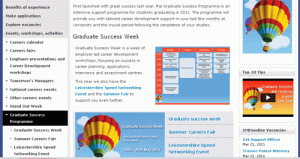
My key learning areas for this project would have to be improving my Photoshop abilities. I used Photoshop to manipulate the AVS images to form the scrolling images in the middle of the home page. Although I already use it quite a lot for image manipulation, I got to play around with layers more which was fun. And also frustrating!
The other thing I learnt was how to create the image map that forms the timetable, using Dreamweaver. Matt did one for Stand Out Week and I looked on, but this time I actually understood. I was surprised how straightforward it was.
More than anything though, I feel I am really building up a good solid knowledge of planning and logical thinking. All the ‘messy things’ as I call them, such as planning a folder structure are really becoming second nature. Sometimes I stop and wonder (in a good way!) how I got here. If you would have told me 12 months ago that I would be doing web development, using HTML, Dreamweaver e.t.c I would have laughed! It’s now something I really, really enjoy. Testament to that was when Matt said I was no longer a ‘normie’ but a geek. I was pleased as punch.
Now the website is up and running, the next thing is to push on with the publicity. I’ll be doing the usual Facebook and Twitter campaign and well as an email to our MailChimp list (See Stu’s blogs about MailChimp here) We’re currently up 4,467 subscribers so this has become a really useful tool for reaching students.
We’ll also have banners and stands out on campus nearer the time and we’ve got some postcard sized flyers to distribute, but as a department, we’re really cutting down on our printed material, so these are really a secondary measure.
If you have any ideas of publicity avenues we might not have thought of, please let me know!
So, as you can tell, this years Graduate Success Programme is bigger and better than last year. There’s so much going on and it’s great to see some emphasis on finalists and supporting them through the transition from University to work.
 So instead of just a list, the pages are now much more interesting, engaging and interactive! Rather than big long lists of useful contacts, I am just mentioning a few key organisations that may be useful for research, and then linking to Prospects where students can find a wealth of further information about that sector if they want.
So instead of just a list, the pages are now much more interesting, engaging and interactive! Rather than big long lists of useful contacts, I am just mentioning a few key organisations that may be useful for research, and then linking to Prospects where students can find a wealth of further information about that sector if they want.





